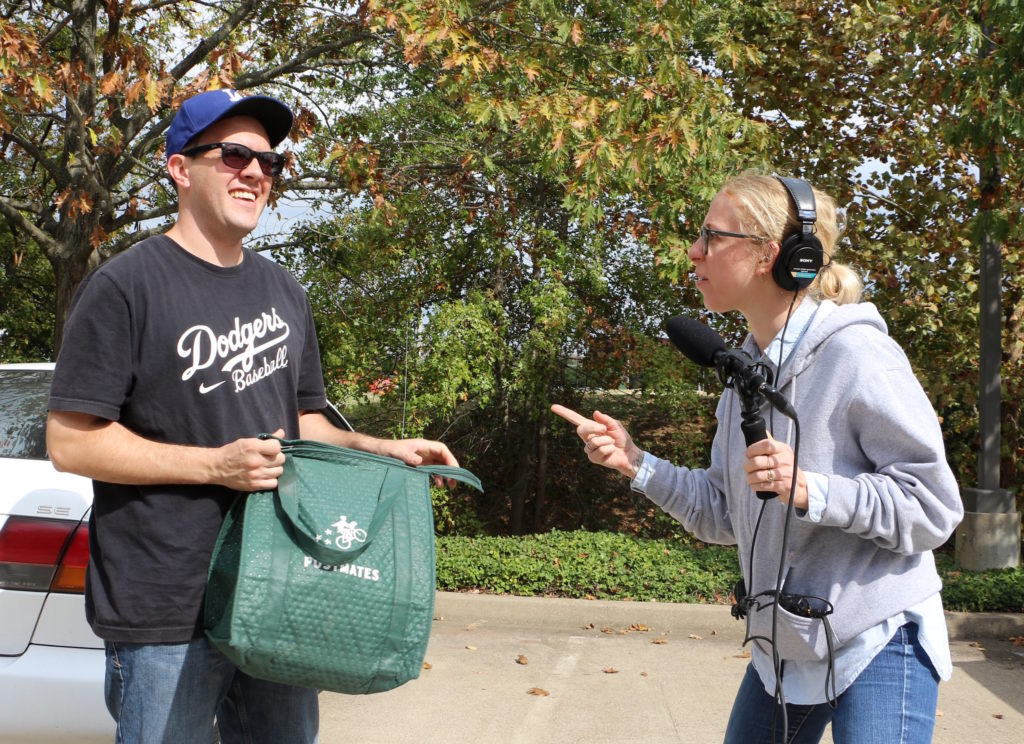
Nashville’s so-called gig economy is booming. The number of people making a living driving for Uber and Lyft, among other app-based jobs, has doubled over the past few years. And they’re rising faster here than nearly every other American city, according to a recent Brookings Institution study.
But what that study didn’t tell us, is who these people are. So I decided to spend a day gigging my way around Music City to meet them.
It started at 6:15 a.m. on a recent weekday. Rather than get in my car, I open up my Uber app, which, full disclosure, I’ve done only a handful of times. Seven minutes later, Vincent Campbell rolls up.
Campbell is a 62-year-old retired police officer. He spends about four hours a day driving for Uber — enough to make a little extra for things like tickets to a Titans game or a splurge that his pension might not cover. He’s been Ubering for about 15 months now. And he loves it. It reminds him a bit of what he enjoyed about being a cop. Not being stuck behind a desk, talking with people, and — in his view — making a difference.
“I always have said from the beginning that I am saving a life by what I am doing now,” Campbell says. “I love it when a person tells me, ‘yeah I am going out to drink tonight, but I decided to take Uber. I say, ‘I’m so glad you did that.'”
Campbell loves the flexibility of his Uber gig. Of course, he doesn’t need health insurance or a 401-K, neither of which Uber offers, and as a retiree, he can handle the unpredictable wages.
I’ll say upfront that the people I met had their own reasons for venturing into the gig economy, but they all had positive feelings about their jobs.
Take my next encounter, for example: which came from James Silva of the meal delivery service Postmates. He arrived promptly with my hot chicken lunch in tow.
“I was in between jobs. I had my own car,” he says. “I really liked the opportunity to make my own schedule and be available for my family.”
Silva, 30, has been working for Postmates full time since April. He says that after 10 years in the military, food delivery is a nice in-between job until he figures out what comes next. “It’s mindless work, but it does pay the bills,” he says.
Plus, he loves doing it in the midst of Nashville’s fast-growing food scene. Every day it seems like a new restaurant opens and he’s there, picking up a meal.
A few hours later, I request my ride home. Nashville native, Tyler Kocher, picks me up. Kocher, 25, is in between sales jobs, so ten days ago he started driving for Lyft and Uber.
Kocher is a classic 20-something: thrown a little off center by a sluggish economy and slightly skeptical about his ride-hailing gig. He knows it won’t last forever, even if he wanted it to. Ride-hailing companies have their eyes on driverless cars.
“These jobs are not going to be along that long. I’d say five years,” Kocher says. But he adds that’s long enough for people like him, people who are “just in between.”
In other words, driving for Lyft or Uber works for a young person biding his time before committing to a career. And on the flip side, Nashville’s growing number of young people are eager consumers of what’s been dubbed the sharing economy.
Mark Muro, a senior fellow at the Washington D.C.-based Brookings Institute, says that all of Nashville’s newcomers have made the city an early adopter
“You have a lot of millennials who don’t really relate to car ownership in the normal way. And are very oriented toward social media and sharing platforms,” Muro says. “Having fast growth of this sort of does say a lot about a city.
My final meeting of the day was Tina Fravel, who brought me two bags of groceries from Publix.
The 31-year-old worked as an art teacher at a public elementary school in Nashville until she lost her job last year. And after six years of teaching she was burned out, anyway, and ready for a change. So she started working for Shipt, a company that sends people out to buy your groceries. Between gas and taxes she earns between $10 and $20 an hour, not as much as teaching. But, she welcomes making her own hours and not having a boss to check in with.
Plus, Fravel even runs into her former students at the nearby Publix where she often shops for people. “They’re like, ‘Hey Ms. Fravel!’ and I’m like, ‘Hey guys!'”
Fravel is surprisingly content. In fact, everyone I met was: the retired cop, the ex-military guy, the sales rep. So, while the gig economy—which is growing exponentially in Nashville—may get a bad rap at times, for these folks it was a good, and gainful, pit-stop in the midst of life changes.


